Using a jack on an SUV can be a scary experience. As a result, SUV owners often find themselves cautious about ensuring they get the right sized jack. However, we've done significant research and found an answer to make this process much less complicated.
Experts recommend using a jack that's rated for at least ¾ of your vehicle's weight. In most cases, SUVs weigh near 5000 pounds. So an acceptable jack would need to have a rating of 3750 pounds, making 2-ton options a solid choice.
But this answer doesn't cover everything you need to know about car jack sizes. Our following discussions will provide much more detail and cover other buying factors. They'll ensure you know more than enough to choose an acceptable jack without issue.

How Do I Choose a Car Jack?
Selecting a car jack for an SUV or other vehicles requires knowledge of specific considerations. But it mainly boils down to five crucial components: size, type, lift height, build quality, and jack stands. So let's dive into each to help you choose the perfect jack for your SUV without issue.
Size
Each car jack will be rated for a specific weight range. You can usually find the actual measurement listed on the jack via a visible sticker. Therefore, it's not difficult to figure out how much weight a jack can handle.
But remember, you don't need to lift an entire vehicle with one jack. So your chosen option doesn't need to have a rating for the vehicle's whole weight. As mentioned earlier, most experts encourage making sure that a jack must be rated for at least ¾ of a vehicle's weight.
For instance, a person with a 6,000-pound SUV wouldn't buy a 1-ton jack. This size jack would only hold up 1/3 of their SUV's weight. A 2-ton jack [4000-pound rating] or 3-ton [6000-pound rating] jack would be a much safer choice for that vehicle.
Type
Car jacks are helpful tools to use on vehicles within several situations. However, these devices come in various types meant for different circumstances. So let's look at the most common ones to see what one best suits your particular needs:
Floor Jacks
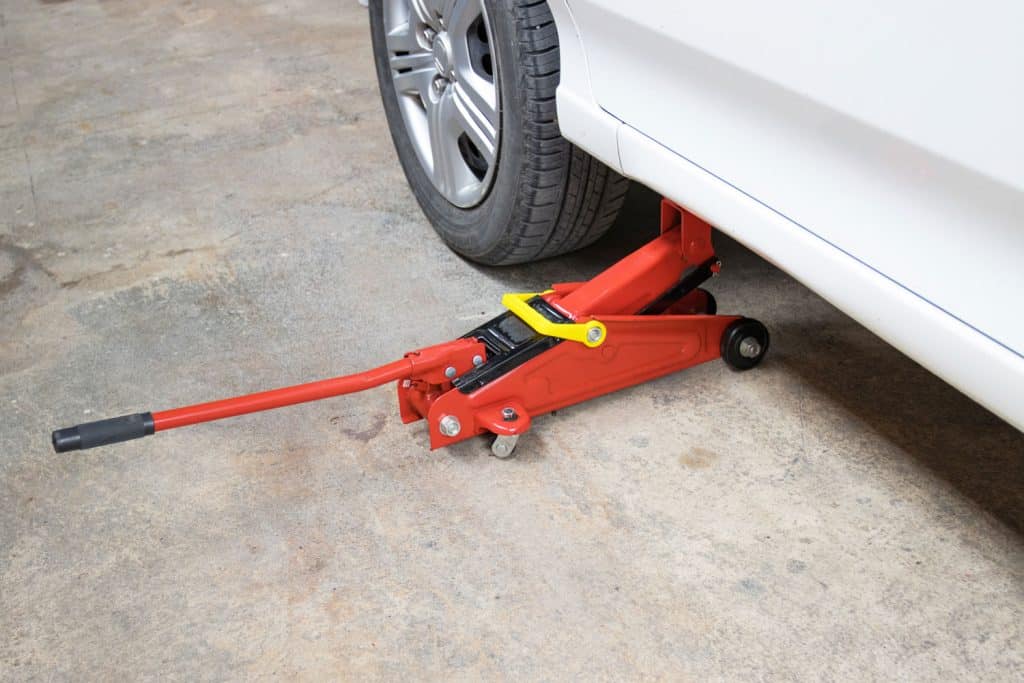
You'll usually find floor jacks in workshops or garages. These options are heavy service jacks that are the most robust and capable options available to car owners. However, floor jacks are too big to fit people looking to purchase a jack for emergency travel situations.
Bottle Jacks
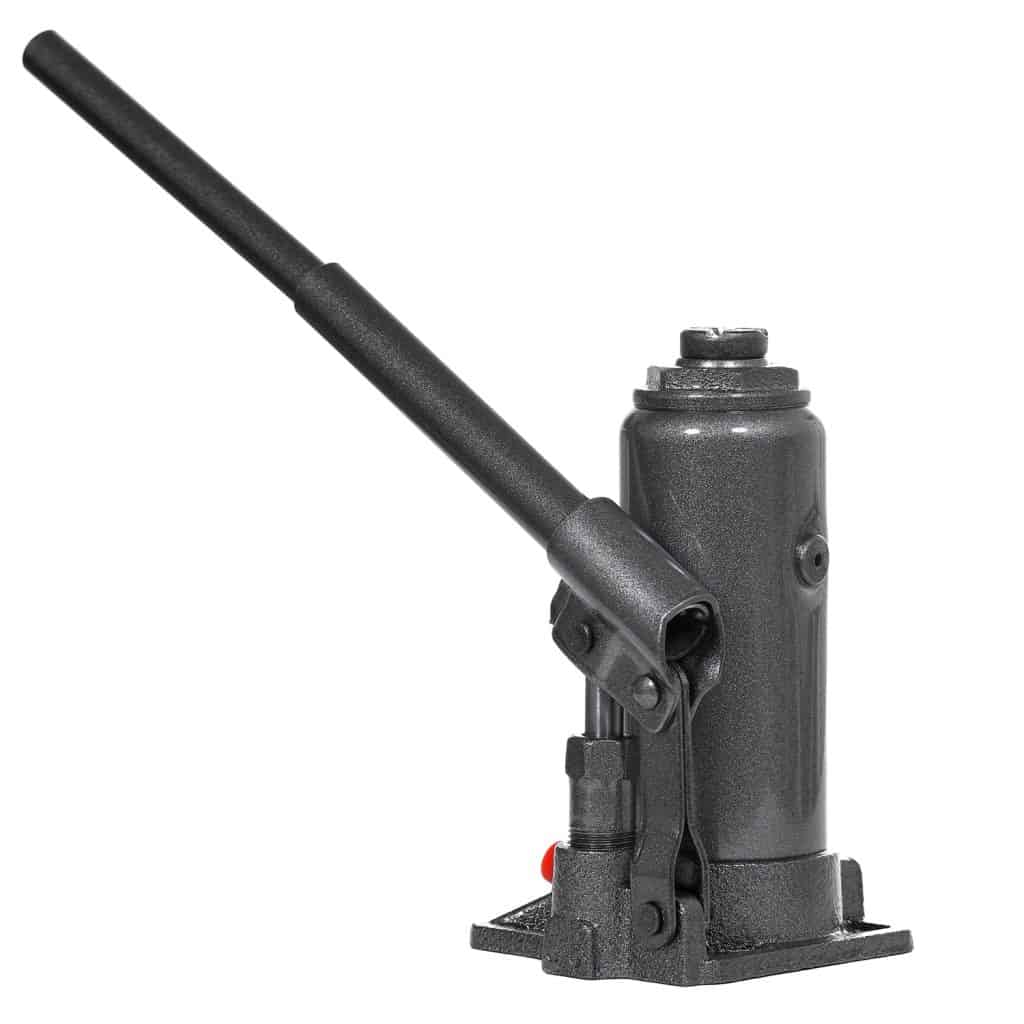
Bottle jacks are much more portable than a floor jack. They utilize a piston mechanism to raise vehicles. You can also expect them to have easy processes as they often use a lever. But these choice jacks can only lift a car to twice the height of the jack, making them solid fits for taller vehicles like SUVs.
Scissor Jacks
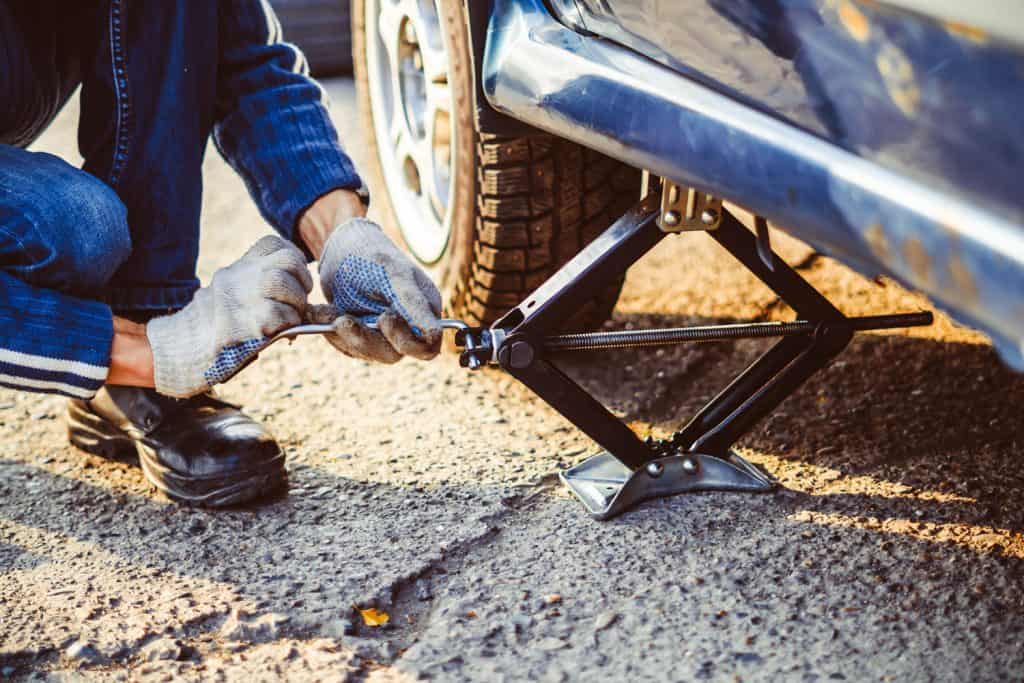
Most vehicle owners will be familiar with scissor jacks. After all, these types are found in almost all spare tire kits. They'll have no issues helping you change a tire, but they're inconvenient for more extensive vehicle repairs. Using scissor jacks can also be tiring due to the endless winding when lifting and lowering vehicles with them.
High Lift Jacks
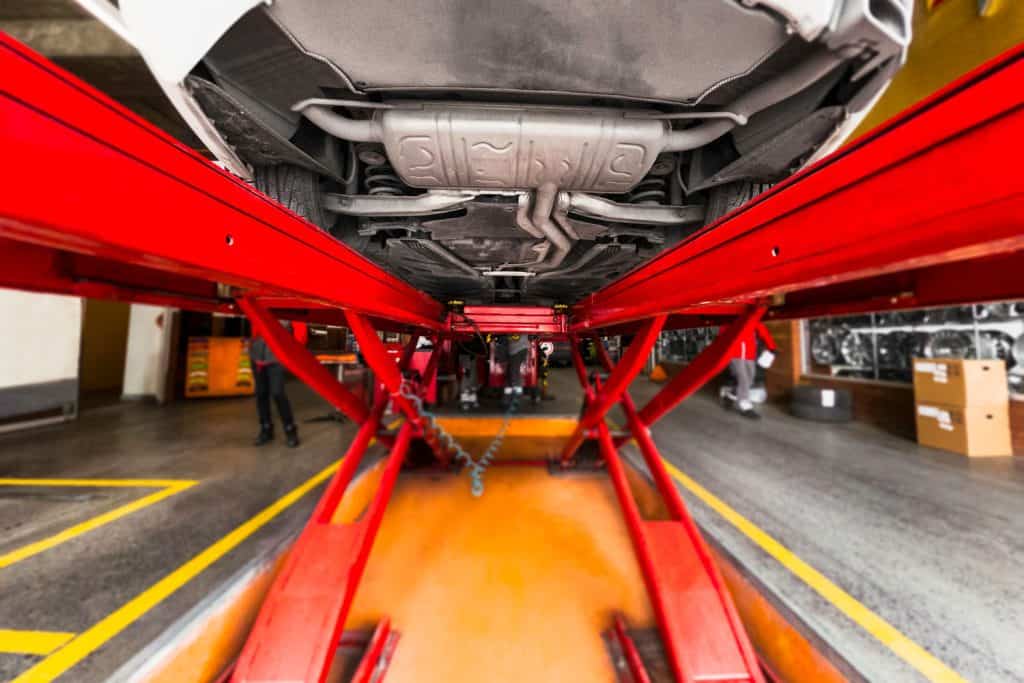
A high lift jack will function using a ratchet mechanism to move up a post rather than rotating a mechanism off the floor. These jacks can be as long as needed, but the maximum is often 60 inches. But they aren't usable on most cars, as manufacturers build them for off-road vehicles with bumpers made from heavy-duty metal.
If you're wondering what SUVs have full-size spare tires, look no further than our article, "What SUVs Have Full-Size Spare Tires?"
Lift Height
As with size/capacity, taller is better concerning a jack's lift height. It'll provide you with more clearance to work on a vehicle once you safely support it using jack stands. But how does a person find s suitable lift height for their SUV or car?
Check your vehicle's clearance by measuring the distance between the ground and your jack supporting point. You can also check the vehicle's manual or look for information online about your particular vehicle's clearance.
Overall, you want the tallest jack possible because it'll provide the most jacking height advantage. But it becomes about finding a balance as the tallest jack isn't going to help if it can't fit underneath your vehicle.
Build Quality
One of the most crucial aspects to consider is a jack's build quality. As you can imagine, high-quality jacks will last a lot longer than cheaply made ones. These options will also end up being more cost-effective down the road.
These reasons alone make it illogical to choose a cheap vehicle jack. In other words, the more affordable option will require replacing it after only using a short period. One of the easiest ways to avoid these low-quality options is lifting the jack and examining its parts.
Most jacks with predominantly metal parts have a higher price tag and offer better quality than options featuring plastic parts. But, of course, these aspects are a bit difficult to examine when you're buying online.
So you'll need to rely on other customers' reviews and other research tools. YouTube videos are another excellent source for feedback about car jack quality.
Jack Stands
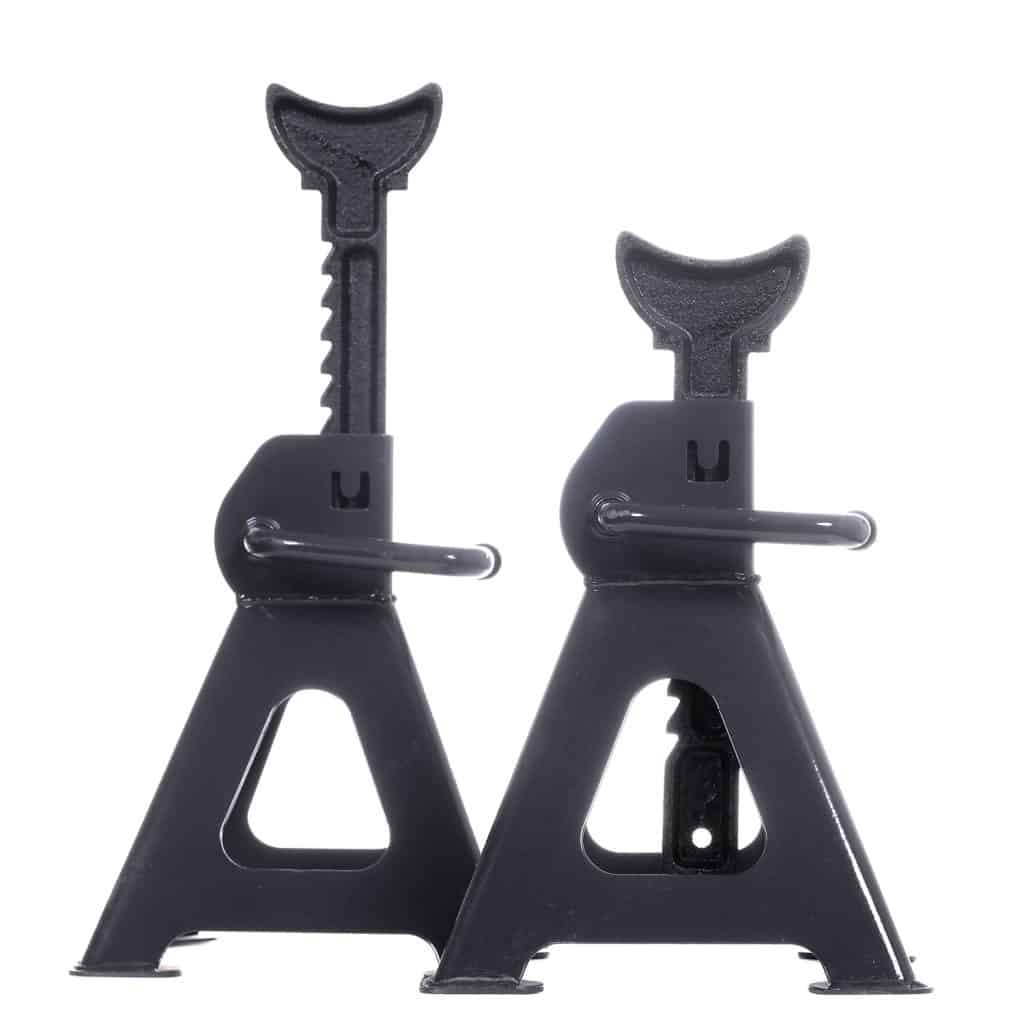
Jack stands are a pivotal part of safely lifting a vehicle with a jack. In other words, they're a necessary secondary component for these tools as they keep the lifted vehicle in place. These items are considered the minimum requirement for holding up any vehicle when working underneath them.
As with jacks, these stands will have a specific weight rating. It’ll need to match your vehicle’s load to ensure nothing bad happens when you’re working underneath it. Anyone who doesn't use them or picks the wrong weight-rated stands is endangering themselves.
But thankfully, these items are relatively easy to use. You slip one or more of these stands underneath a car and gradually lower the vehicle to sit within the saddle. From there, the large locking pins will hold the vehicle in place to prevent any dangerous issues.
Safety Tips for Using a Car Jack
The most apparent reason for utilizing one would be changing a tire. But there are other jobs like inspecting brakes that'll require you to get under the vehicle. However, if you've never used a jack before, these tasks might make you nervous.
It's an entirely understandable feeling as cars or SUVs can easily crush a human being. But there are a few simple safety precautions and tips to make this job less disturbing. If you follow them and adhere to the user's manual, jacking up your vehicle will be completely safe:
- Never expect a car jack to hold a vehicle in place. These tools are only meant for raising the car.
- Put the car in park or first gear if you have a manual transmission. Otherwise, the vehicle could roll during the procedure.
- Anyone who intends to work on the underside of their vehicle must use jack stands that can support the vehicle's weight.
- Make sure to use jacks on a flat surface rather than a slope. If you don't have another option, turn the wheels towards the street's curb. It would be best to place chocks behind the wheels remaining on the ground to prevent any accidental rolling.
- Turn on your hazard lights to warn other drivers.
- Don't attempt to change a tire on a busy highway or freeway. Call roadside assistance or alert a passing patrol car for help with whatever's going on with your vehicle.
If you have a Kia Sportage SUV and are having difficulty removing your tire jack, check out "How To Remove The Jack From Kia Sportage." It'll walk you through locating the jack and removing it from its location.
Is a 1.5-ton jack enough for SUV?
A 1.5-ton jack should be enough for an SUV that's 4000 pounds or less. If your SUV's over 4,000 pounds, you'll need 2-ton jacks or higher, depending on the vehicle's weight.
Do I need a 2 or 3-ton jack?
2-ton jacks will work on any 5,250-pound vehicle or less. But if it exceeds the 5,250-pound limit, it'll require a 3-ton jack or higher to work on your particular vehicle safely.
In Closing
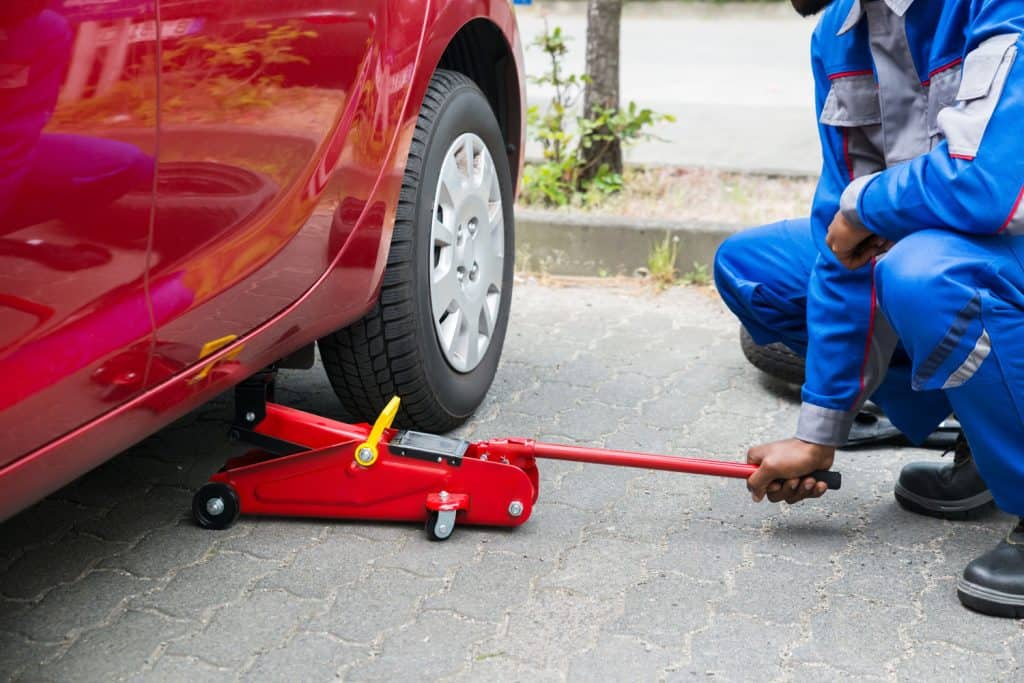
We hope our discussions about car jacks for SUVs answered your concerns. Choosing one for your vehicle now shouldn't be much of an issue. But if you have a remaining question, please feel free to use our comment section. Thanks for reading!
